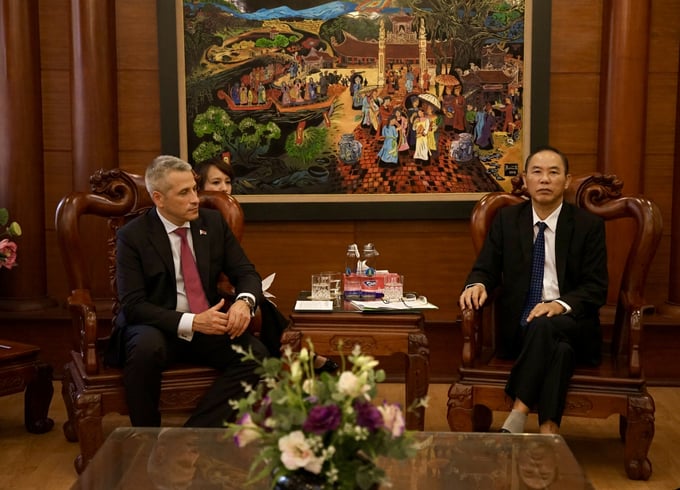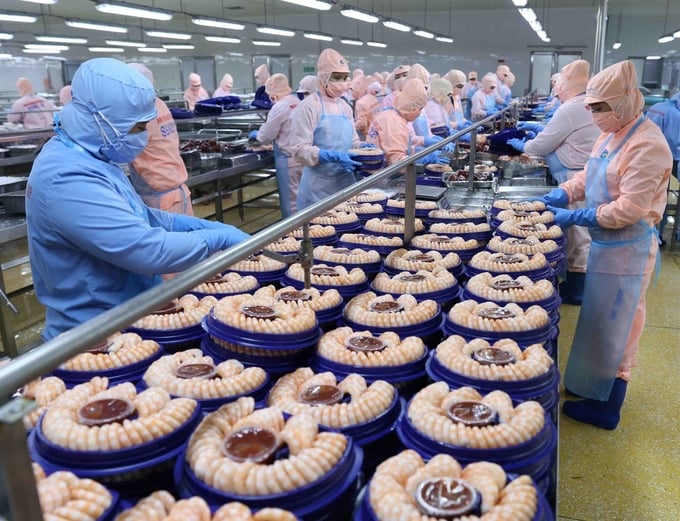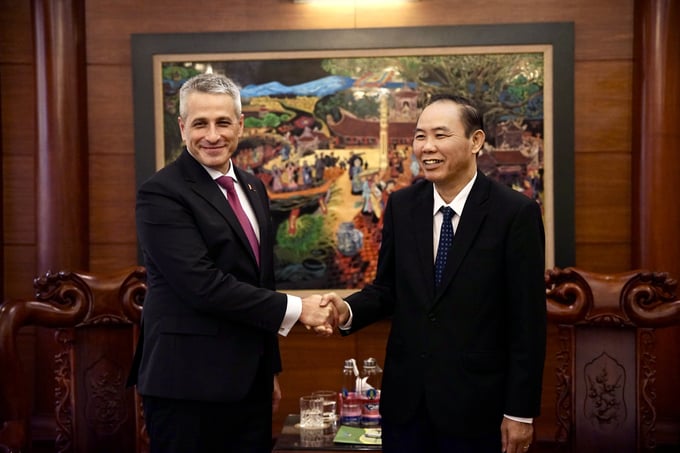May 21, 2025 | 08:02 GMT +7
May 21, 2025 | 08:02 GMT +7
Hotline: 0913.378.918
May 21, 2025 | 08:02 GMT +7
Hotline: 0913.378.918

On the morning of June 12, Deputy Minister of Agriculture and Rural Development Phung Duc Tien received and worked with Belarusian Ambassador to Vietnam Uladzimir Baravikou.
In terms of economic and trade collaboration, based on Vietnamese customs data, the whole bilateral trade volume between Vietnam and Belarus in 2023 amounted to USD 65.3 million, indicating a decline of 42.6% compared to the previous year. Vietnam's exports to Belarus amounted to USD 24.1 million, marking a 15.4% increase. Conversely, imports from Belarus to Vietnam totaled USD 41.2 million, reflecting a significant decrease of 55.6%.
As of the first quarter of 2024, Belarus has three investment projects in Vietnam, amounting to a total capital of USD 32.25 million. This places Belarus in the 68 position out of 145 nations and territories that have made direct investments in Vietnam.
Vietnam mostly exports fish, rice, cassava, cashew nuts, and tea to Belarus. In addition, there is great promotion of other items for export, including tropical fruits, vegetables, and coffee. In contrast, Vietnam primarily buys fertilizers from Belarus.
Deputy Minister Phung Duc Tien emphasized that seafood is a prominent agricultural product in Vietnam, contributing significantly to the country's exports to Belarus. Only 55 Vietnamese seafood processing plants have been granted permission to export seafood to the Eurasian Economic Union (EAEU), of which Belarus is a member. At present, there are 29 facilities that have been suspended (formerly allowed but temporarily prohibited for evaluation and correction) and approximately 100 qualified facilities that have not yet been granted licenses to import fish into the EAEU.

Seafood is one of Vietnam's main agricultural products exported to Belarus. Photo: Thanh Cuong.
"Currently, the Ministry of Agriculture and Rural Development has granted Belarus permission to sell milk and dairy goods abroad. Additionally, they are currently evaluating requests to export meat products, with a particular focus on cattle. Considering the potential of both countries, the existing trade turnover is still rather small", Deputy Minister Phung Duc Tien stated.
Mr. Nguyen Van Long, the Director of the Department of Animal Health, confirmed that the Department has reviewed the documents provided by Belarus regarding beef. As a result, the Department has issued Official Dispatch No. 33, stating that the documents on disease and food safety monitoring for boneless beef from Belarus largely comply with Vietnamese standards. Official Dispatch No. 1075 has recently said that the Department intends to carry out an on-site inspection of Belarus' boneless beef manufacturing chain in order to finalize the risk assessment procedure for imports.
Belarus has not yet furnished the Department of Animal Health with the necessary supplementary information to evaluate the potential dangers associated with importing pork. The Department will evaluate the registration dossier for chicken exports once it has finished reviewing the registration dossier for pork exports from Belarus.
A delegation is expected to visit Belarus in the third quarter of 2024 to inspect the livestock and slaughter system of the Department of Animal Health.
The Belarusian Ambassador to Vietnam Uladzimir Baravikou, evaluated the bilateral trade between the two nations as exhibiting favorable developments, characterized by the exportation of a wide array of Vietnamese agricultural commodities to Belarus. The ambassador expressed gratitude to the Department of Animal Health and the Ministry of Agriculture and Rural Development for their prompt and effective response in certifying beef products.

To promote agricultural trade activities between the two sides, the Belarusian side hopes that the two agricultural working groups will hold online meetings at an appropriate time.
In order to facilitate agricultural trade between the two sides, Belarus expresses its desire for the two agricultural working groups to convene virtual sessions at a mutually convenient time. The envoy proposed a mutual exchange of information on crop varieties, with Belarus offering its expertise in this field. Additionally, the ambassador recommended facilitating the opportunity for Vietnamese students to pursue agricultural research and training in Belarus.
Deputy Minister Phung Duc Tien welcomed the suggestion for virtual meetings between the two Ministries of Agriculture to delve into more prospects for collaboration.
The Deputy Minister suggested increasing the importation of seafood, coffee, nuts, fruits, rice, and other agricultural commodities from Vietnam to Belarus. These Vietnamese items are robust and do not directly rival Belarusian products, particularly in light of continuous concerns about food security and conflicts. Both parties must actively endorse and enable expeditious customs clearance to foster export-import operations in accordance with regulations.
In addition, the Ministry of Agriculture and Rural Development's leadership proposed that both parties choose prominent trading enterprises as central hubs to connect and facilitate the import and export of these agricultural products.
Translated by Dieu Linh

(VAN) In 2024, over 295 million people across 53 countries and territories faced acute hunger—an increase of almost 14 million people compared to 2023, while the number of people facing catastrophic levels of hunger reached a record high.

(VAN) World Environment Day 2025 (June 5) carries the theme 'Beat Plastic Pollution' continuing to emphasize the global urgency of addressing the plastic waste crisis.

(VAN) This was the assessment shared by experts at the workshop titled 'Assessing the Role and Potential of Low-Emission Rice Production Systems in Vietnam,' held on the morning of May 19.

(VAN) Cai Rong Port is the fisheries control center of Quang Ninh, helping to monitor fishing vessels, combat IUU fishing, and remove the EC's 'yellow card'.

(VAN) The German Agricultural Society (DLG) explores the possibility of establishing a mechanization service center in Vietnam’s Mekong Delta to support farmers in accessing and utilizing advanced machinery.

(VAN) On May 16, the Department of Water Resources Management, in collaboration with the Food and Agriculture Organization of the United Nations (FAO), held a signing ceremony for the GEF-8 project document.

(VAN) Food safety, mechanization, vocational training, and market opening are key areas of cooperation expected between the Vietnamese Government and the Federal Republic of Germany.